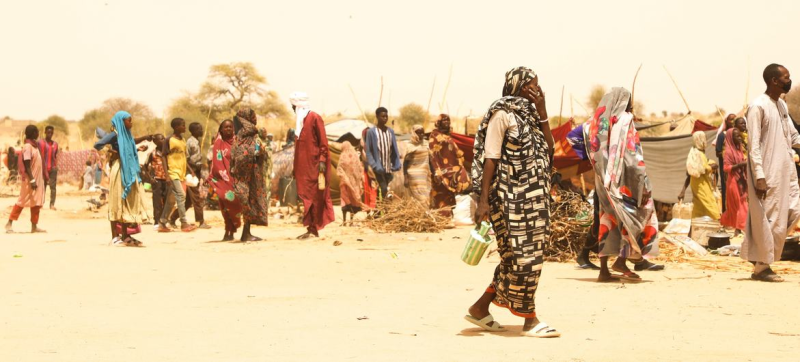- Hurricane Melissa: UN Appeals $74M to Aid 2.2M in Cuba |
- Doha Summit Stresses Urgent Investment in People and Peace |
- Sand syndicates tighten grip on Bangladesh's northern region |
- Prof Yunus orders security forces to hunt down Ctg attackers |
- IU suspends 3 students for assaulting journos, warns 9 others |
UN Warns of Deepening Crises in Sudan, Kyrgyzstan, DRC and Haiti

Refugees, most of them women and children, who fled violence in El Fasher and other parts of Darfur, arrive in Chad.
In Sudan, civilians in government-held El Fasher in the west of the war-torn country remain trapped without food, water, or medical care, the UN Office for the Coordination of Humanitarian Affairs (OCHA) said on Monday.
The warning from OCHA follows ongoing and repeated attacks on El Fasher, which remains under siege by the paramilitary Rapid Support Forces (RSF).
Ten days ago, the city’s Daraja Oula neighbourhood was targeted in a drone strike, killing at least 57 civilians displaced by the conflict.
Nearly 30 months of war in Sudan have left two-thirds of the population in dire need of humanitarian assistance, including 16 million children.
Famine has been confirmed in several parts of the country, leaving millions at risk of starvation.
Meanwhile, disease outbreaks and worsening climate shocks are compounding the crisis, OCHA reported, with more than 3,400 deaths from cholera since July 2024 and over 120,000 suspected cases so far.
Displacement continues
The International Organization for Migration (IOM) estimated that more than 3,000 people were newly displaced in North Darfur last week — including 1,500 from El Fasher and another 1,500 from Abu Gamra — following renewed fighting.
Tensions are also rising sharply in the Kordofan region. Nearly 1,000 people were displaced from Lagawa town in West Kordofan on Saturday due to growing insecurity, UN spokesperson Stéphane Dujarric warned.
In South Kordofan, the town of Dilling and the state capital Kadugli remain under siege, with supply routes cut off and shortages of essential goods worsening daily.
“Civilians across Sudan continue to bear the brunt of this relentless violence,” said Mr Dujarric. “Despite numerous challenges, our humanitarian colleagues continue to provide vital assistance in areas we and our partners can safely access.”
Kyrgyzstan: Death penalty move would breach law, Türk warns
The UN High Commissioner for Human Rights, Volker Türk, on Monday urged the authorities in Kyrgyzstan not to reintroduce the death penalty following the rape and murder of a girl last month.
He warned that reinstating capital punishment would constitute a serious violation of international law.
Kyrgyzstan stopped using the death penalty in 1998 and permanently abolished it in 2010, after ratifying the Second Optional Protocol to the International Covenant on Civil and Political Rights (ICCPR).
According to Mr Türk’s office, authorities are now seeking to amend the Constitution to allow the death penalty in cases such as child rape, and are even considering withdrawing from the optional protocol.
“These rights cannot be taken away, no matter the justification,” said the High Commissioner, adding that no justice system is infallible and that reintroducing the death penalty would inevitably lead to the execution of innocent people.
Health crisis in DR Congo
OCHA reported on Monday that health systems across North and South Kivu in the Democratic Republic of the Congo (DRC) have effectively collapsed.
Around 85 per cent of health facilities in the volatile eastern region, where armed groups operate, are facing severe medicine shortages, while nearly 40 per cent have lost medical staff — further weakening essential services.
In North Kivu alone, a third of all health facilities in conflict zones have been destroyed, looted, or abandoned, leaving millions with extremely limited access to healthcare.
To make matters worse, disease outbreaks are surging. “Since the beginning of the year, health partners have recorded over 8,600 cases of cholera, 8,000 cases of monkeypox, and more than 10,500 cases of measles,” said Mr Dujarric.
Without urgent action, the UN estimates that 6,000 preventable deaths could occur by the end of the year.
The Humanitarian Needs and Response Plan for the DRC is currently only 16 per cent funded, with $410 million received — while an additional $6 million is urgently needed to maintain life-saving operations.
In better health news, authorities have discharged the final patient from the latest Ebola outbreak, which the World Health Organization (WHO) described as “an important milestone.”
A total of 19 patients have recovered, and no new cases have been reported since 25 September. In total, 64 cases — 53 confirmed and 11 probable — were recorded since the outbreak began on 4 September in Kasai Province.
Cholera surge in Haiti
In Haiti, OCHA warned of a resurgence of cholera in the Ouest department amid ongoing gang violence.
Health authorities have reported new cases in Pétion-Ville after 11 weeks with none detected. Between 5 and 11 October, 139 suspected cases were recorded, including more than 20 confirmed and five deaths.
Pétion-Ville and parts of the capital, Port-au-Prince — including Cité-Soleil — remain on red alert due to the risk of cholera spreading among internally displaced communities.
Haiti’s Ministry of Health, supported by the UN-backed Pan American Health Organization (PAHO) and humanitarian partners, has intensified disinfection campaigns, community awareness drives, and the distribution of chlorine, safe water, and hygiene kits in affected areas.

